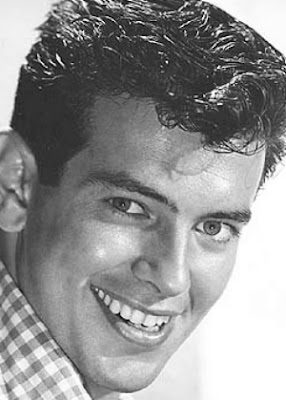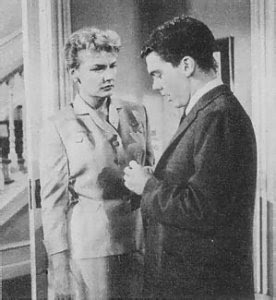Anyone familiar with this blog and my Youtube channel knows that I have a fanatical fixation with teenage oriented movies from the mid-1950's to the mid-1960's. My friends and fellow DVD collectors on Youtube, who don't share my fixation, have given these films the label "teen angst flicks", a label I have happily adopted for my own usage. While most film fans can recognize the merits of serious, innovative classics like BLACKBOARD JUNGLE and REBEL WITHOUT A CAUSE, both big studio productions released in 1955, not everyone is as thrilled as I am with lower budget exploitational titles such as HIGH SCHOOL CONFIDENTIAL and JUVENILE JUNGLE, both released in 1958. And film scholars who show reverence for James Dean and Natalie Wood are usually more dismissive towards lesser known talents like Scott Marlowe and Yvonne Lime.
Me? I love them all. Low budget, big budget, it doesn't matter. There is something magical for me about these movies that took hold of my imagination way back in the 1960's and 1970's when so many of them played over and over on television. No doubt it has to do with the general themes of rebelliousness, loneliness, sexual awakening and alienation from parents that can be understood by every young person in every era. But for me, it also reflects a fascination for an era that existed before I entered my own teen years in 1964. The early days of rock 'n roll, the malt shops, the leather jackets and the D.A. haircuts worn by the boys in those movies were all part of the culture of the generation before me. I guess every kid pays close attention to what the older kids are doing and tries to imitate them as much as possible. That teen angst passes like a virus from one generation to the next, and gets updated and modified accordingly.
As more and more of these teen oriented films came out, the plots expanded to include dragstrip dramas, adventures in reform schools, teenage werewolves and endless variations on the dangers of premarital sex. Some of the movies featured comedy and music, and some were trying to be deadly serious. And usually the parents and other adults (teachers, police) were portrayed as the enemies or simply clueless obstacles to the kids and their longing for freedom and excitement. Adults tended to be portrayed as one dimensional characters. But every once in a while there was a film that stood out for its exploration of a slightly darker side of family relationships. One such film was THE PARTY CRASHERS, a Paramount picture released in 1958. Because of its rather lame title, one might expect nothing more than the usual exploitational atmosphere. This film, however, has a little bit more to offer.
The film begins with a teenage party in a private home being crashed by a local bad guy, Twig Webster (Mark Damon) and his unruly pals. The party quickly devolves into a brawl and someone calls the cops. Most everyone manages to get away before the cops arrive. Barbara Nickerson (Connie Stevens) and her boyfriend Josh Bickford (Robert Driscoll) were at the party. Barbara had gotten bored and told Josh she wanted to leave. But when Twig and his gang arrived, she was intrigued and decided to stay. Barbara is turned on by Twig and his reckless attitude. She tells Josh: "He's like an animal." Josh is appalled by Twig's behavior and upset by Barbara's attitude. Josh goes home to his obviously caring parents (Frances Farmer and Denver Pyle). Twig, however, goes home to find his father (Walter Brooke) drunk and complaining that his mother has been out all night, supposedly seeing a movie with a girlfriend. Twig's home life is established as unhappy and chaotic. His mother (Doris Dowling) comes home and has an argument with her husband, berating him in front of their son. She even physically assaults her husband when he accuses her of being a tramp. She seductively stands close to Twig and demands that he kiss her.
 |
| Mark "He's like an animal!!" Damon |
The next day, Josh goes to Barbara's house to find that her father (Onslow Stevens) knows all about the party and has invited Twig over to encourage friendship between the two boys. Josh is not happy. But he agrees to take Barbara to a club called The Shack at Twig's suggestion. Twig stops at his house to ask his father for extra money. His mother has gone out again and his father is drunk. He and his father argue. His father threatens to sell his son's car if he crashes another party. He tells Twig about a big party that will be taking place at a local motel. Twig doesn't know anything about the party. He also doesn't know that Mr. Webster suspects his wife will be there and is secretly encouraging his son to go there and find her.
Twig talks Barbara, Josh, and a few of their friends into crashing the party, just so he can spite his father. When they get there, they find out it isn't a teenager's party, but one attended by adults the same age as their parents. The drunken partygoers refuse to let the kids leave, locking the door. The grown men go after the young girls while the grown women go after the young boys. The kids are appalled and embarrassed and want to get out. Josh starts a fight with one of the men that turns into a brawl, while Twig goes to look for a back door from which they can escape. He sees a man coming out of a bedroom with his shirt unbuttoned. He goes into the room and finds his mother sitting next to an unmade bed. He tries to get her to leave, but she refuses. In a struggle, she falls down a flight of stairs and is seriously injured. Twig runs away when the police show up. He catches up with Barbara and demands the keys to her car. When she refuses he starts beating her. He then gets into a fight with Josh and everyone is taken to the police station. Barbara and Josh's parents come to take their children home and resolve to be better parents. Twig's father is there alone and feeling terrible guilt for baiting his son to crash the party. He goes to the hospital to learn his wife has died. Twig arrives with a police officer to find out how his mother is. After hearing that she has died, Twig asks his father to go with him to the police station.
 |
| Bobby Driscoll and Connie Stevens |
High grade melodrama, to be sure. But well acted by all concerned, and well directed by Bernard Girard, who also helped write the screenplay. Like the unhappy teens in REBEL WITHOUT A CAUSE, the kids in this film all have affluent parents and live in comfortable homes. They all have cars and wear nice clothes. Even Twig and his pals are well dressed and don't look like the big city delinquents depicted in many similar teen angst films. These kids don't lack anything material. But when we meet their parents, we can understand where much of their confusion and dissatisfaction are coming from. Twig lives in the middle of a domestic train wreck. And there are some dysfunctional vibes coming from Barbara's house as well. When we first meet Mr. Nickerson, he's busy mixing himself a morning cocktail when Barbara comes into the room. She's all dressed up. Her father gives her a blatantly lascivious look. Very disturbing. But what's even more disturbing is the look she gives her father; a knowing smirk, as if she knows the effect she has on him and likes it. Then dad starts dancing with her around the room, their hips moving in synch. It's a truly uncomfortable sequence. How the censors managed to look past this is beyond me. Meanwhile, Mrs. Nickerson comes into the room announcing that she just finished writing her latest speech about juvenile delinquency that she will be giving at the next PTA meeting. She is oblivious to her family and really doesn't want to be bothered.
The true monster in this story is Twig's mother. Not only is she committing adultery and spousal abuse, but she acts inappropriately with her son. As stated in the plot synopsis, she stood very close to Twig and told him to kiss her, making Twig obviously uncomfortable. A similar thing happens when Twig finds her at the party. She once again stands very close to her son when she asks him to let her go back with her friends. The look on her face is one of seduction, and Twig is sickened by it. These distorted adult/child relationships are magnified into an ugly reality by the way the adults at the party start latching on to the teenagers, young enough to be their own kids, and treating them as sexual objects.
 |
| A disturbing moment between Doris Dowling and Mark Damon. |
 |
| Frances Farmer and Bobby Driscoll |



No comments:
Post a Comment